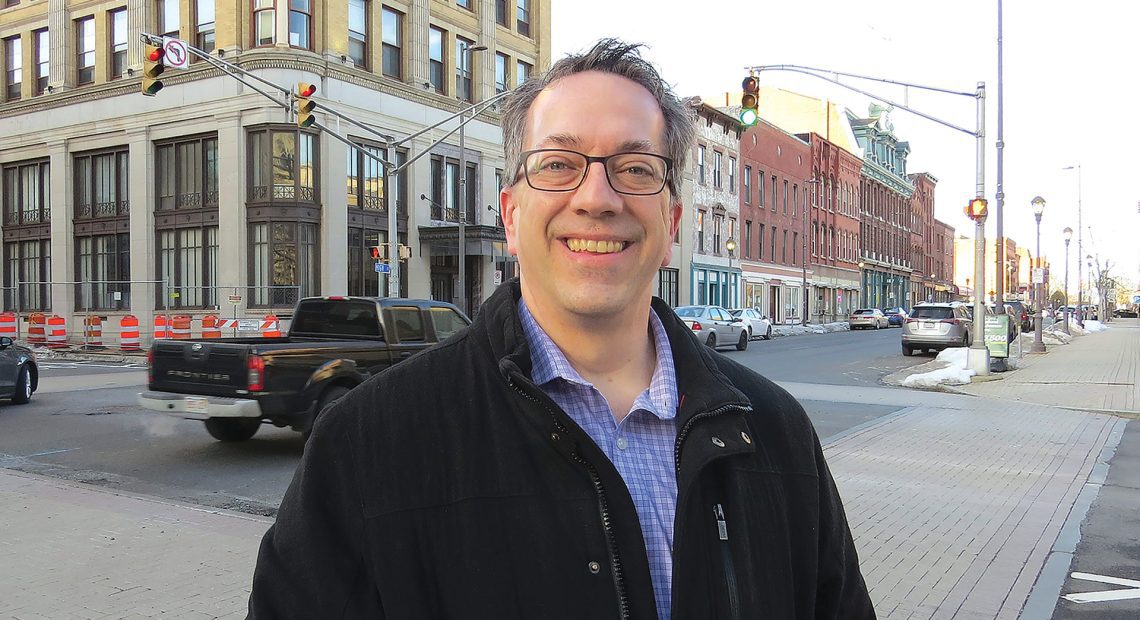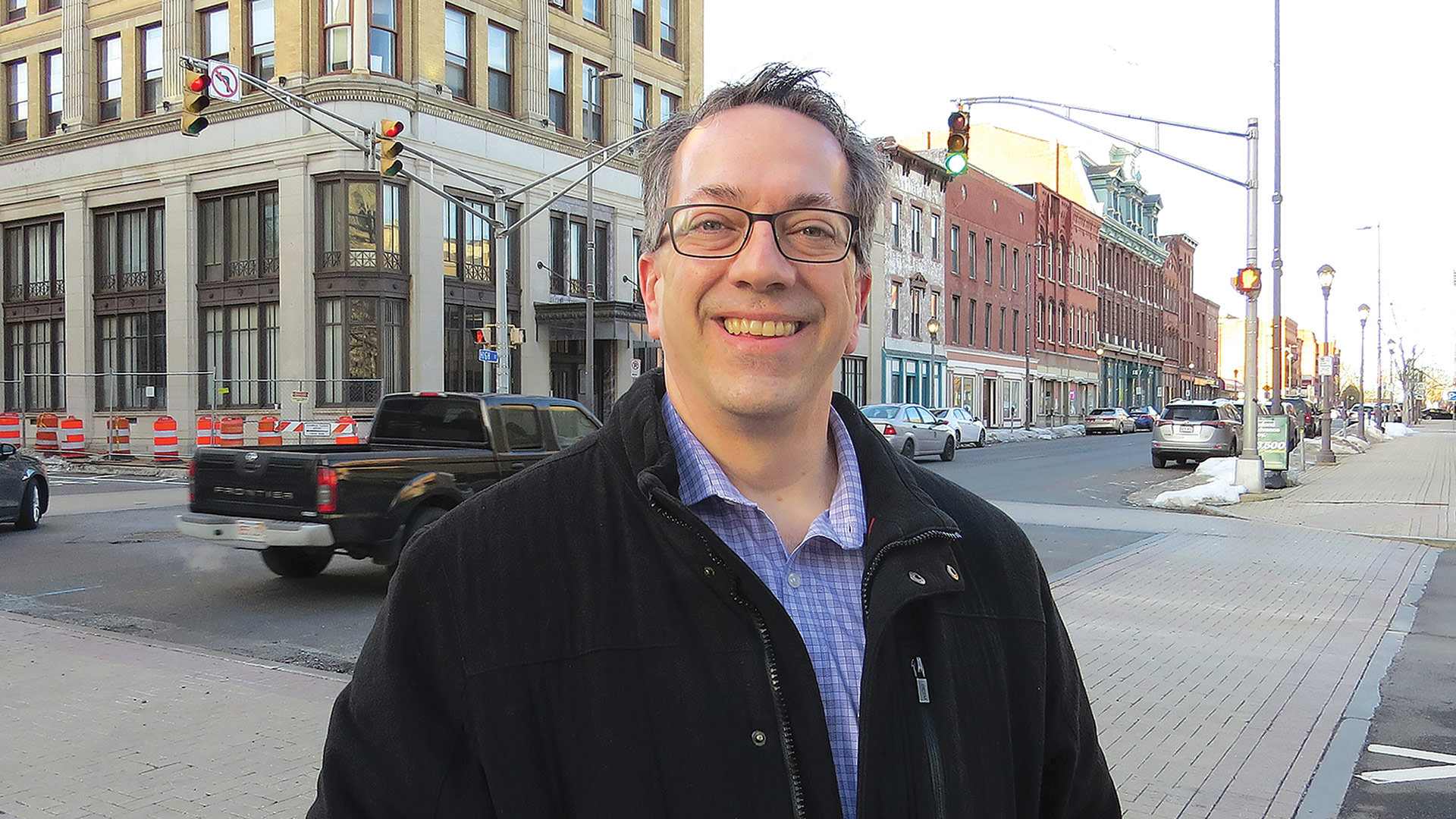
It’s Still an Economic Driver, While New Law Addresses Thorny Issues
Cannabis in Flux

Aaron Vega says cannabis has been a definite economic driver in Holyoke’s downtown and canal district.
According to the Cannabis Control Commission (CCC), legal marijuana is now an annual $3 billion business in Massachusetts.
The communities that have embraced it from the beginning, like Holyoke, can attest to cannabis as an economic driver in terms of commercial real estate, jobs, and other opportunities. The city now has four dispensaries, three grow facilities, and a testing lab up and running, with dozens of other applications at various stages of the permitting process — a process, city Planning & Economic Development Director Aaron Vega said, that was always intended to be easy to navigate.
“This community voted in favor. The mayor was in favor. As a state representative, I was in favor. And we didn’t want to make it more difficult. It was challenging enough with the regulations coming down from the state. We saw this as an industry that could take over some vacant and underutilized buildings, and that’s what informed how we went forward.”
That has indeed occurred. “We’re very excited about the investment that has happened — tens of millions invested in these downtown buildings because of cannabis, and 500 jobs that didn’t exist three years ago,” Vega said, noting that the cannabis enterprises themselves aren’t an endgame, but a way to spur even more investment.
“What do you do with 500 people? You make sure they’re going to your concerts, going to your restaurants and events, utilizing your local food trucks. And then there’s the ancillary businesses to the cannabis industry; how do we lure them to the city and make it even more beneficial for companies to do business in Holyoke?”
Other cities and towns have, to varying degrees, told similar stories. But the host-community agreements they’ve put forward have not always been well-received, and that was one of several issues addressed last month by a multi-faceted cannabis bill passed overwhelmingly by the state Senate and House of Representatives and signed into law by Gov. Charlie Baker.
“We saw this as an industry that could take over some vacant and underutilized buildings, and that’s what informed how we went forward.”
Among its main elements, the law clarifies the host-community agreement (HCA) process by authorizing the CCC to prioritize social-equity program businesses and economic-empowerment priority applicants for expedited review.
It also clarifies the scope of HCAs and adds new criteria, mandating that no host-community agreement can include a community impact fee that is beyond the business’s eighth year of operation, the community-impact fee must be reasonably related to the actual costs required to operate a cannabis business in a community, the CCC must review and approve each HCA as part of the license application and renewal process, and all host communities must establish procedures and policies to encourage full participation in the regulated marijuana industry by people from communities that have been disproportionately harmed by marijuana prohibition and enforcement.
“Communities of color across our country have historically been criminalized, prosecuted, and left out of the conversation in regards to cannabis legalization,” state Sen. Adam Gomez said. “When cannabis was legalized in Massachusetts, those same communities continued to be barred from the conversation table and left behind, with historic barriers preventing them from growing small businesses in meaningful ways. The legislation passed by the legislature will remove those barriers.”
The law also expedites the expungement process, Gomez noted. For individuals seeking to expunge a record for previous offenses that are now decriminalized, the law requires the court to order the expungement of the record within 30 days of the request and expunge records for possession or distribution of marijuana based on the now-legal amount.
“It is incomprehensible that anyone who was charged with a marijuana-related offense still has that on their record in our state, especially when you can drive down the street to a dispensary to buy the same product that that person was arrested for,” Gomez said. “I was proud to support this legislation and can’t wait to see cannabis businesses run by BIPOC owners flourish as a result.”
Growing Pains
The law makes other major changes as well, including a clarification of the local social-consumption approval process.
The advent of what’s known as cannabis cafés will give renters, public housing tenants, and tourists a legal place to use a legal substance. Under this legislation, a city or town may allow for social consumption sites through the passage of a bylaw or ordinance.
The legislation also creates a trust fund to make grants and loans to social-equity program participants and economic-empowerment priority applicants, which will give entrepreneurs from communities that have been disproportionately harmed by marijuana prohibition and enforcement better access to grants and loans to get their businesses off the ground.
In addition, 15% of the revenue collected from the sale of marijuana and marijuana products must be transferred to the Cannabis Social Equity Trust Fund, which will be administered by the Executive Office of Housing and Economic Development in consultation with a newly created Cannabis Social Equity Advisory Board.
“It is incomprehensible that anyone who was charged with a marijuana-related offense still has that on their record in our state, especially when you can drive down the street to a dispensary to buy the same product that that person was arrested for.”
“This legislation will create a more equitable cannabis industry in the Commonwealth,” said state Sen. Jo Comerford, noting that lawmakers “approached this issue with expertise and compassion, and the resulting bill will bring more diversity and equity to this industry.”
House Speaker Ronald Mariano added that “the passage of this legislation will help to ensure that those who have been historically impacted by marijuana prohibition can find new opportunity in the emerging industry. This legislation will help to support folks who have faced generations of inequality secure the needed capital to launch a cannabis business.”
The loan fund highlights one of the challenges of starting a business that’s technically illegal under federal law. Although there have been rumblings that the U.S. Congress could move to decriminalize cannabis and open up traditional financing to such businesses, nothing has been done so far.
“It’s still a hard-money business,” said Tim Sheehan, chief Development officer for the city of Springfield, and that affects both entrepreneurs and property owners. “That’s challenging from a real-estate standpoint. If that were to change, it would provide a more stabilized financial underpinning for the industry itself, and obviously, that would translate into folks that have space feeling far more comfortable in terms of the security they have relative to leasing and everything else. It would be accepted in the mainstream financial market.”
While Springfield didn’t embrace cannabis in the unfettered way Holyoke did — the city has put forward two rounds of retail applications and one for a grow facility, but that project, by Page Cultivate LLC in East Springfield, was derailed by the City Council in May over a site-plan change and other concerns — many of its leaders recognize the economic value of the burgeoning industry.
“Once it was legalized, there was clearly a focus on it becoming an economic benefit for the city,” Sheehan said. “Much like when gaming was legalized, we looked to see what the economic potential of the cannabis industry would be relative to both city finances and economic impact in terms of the marketplace.
“Much like when gaming was legalized, we looked to see what the economic potential of the cannabis industry would be relative to both city finances and economic impact in terms of the marketplace.”
“Obviously, the industry has had an impact on storefront and warehouse space, and I would quantify that as a positive impact,” he went on, adding that it remains to be seen what kind of impact the cannabis trade will have on the surrounding residential real-estate market.
“Caution is the watchword. As an industry, it remains to be seen what the saturation point is, and I really think that needs to be factored in through the process with regard to how many of these establishments you’re going to allow, whether it be a grow facility or how many retail establishments you’re going to allow. There is a limited market.”
In the Weeds
The cannabis industry’s potential is still unknown, though the early results in terms of new businesses, tax revenues to communities, and jobs have been positive.
But Sheehan is right that no one really knows what the saturation point is, if there is one. And the Legislature’s sprawling cannabis bill last month was an admission that plenty about the permitting process — especially for traditionally disenfranchised communities — needs to be addressed.
As Senate President Karen Spilka put it, “I am thrilled we were able to reach a deal on this bill, which will take meaningful steps toward ensuring communities who have historically been harmed by marijuana criminalization can access resources to enter this industry.”
Joseph Bednar can be reached at [email protected]




